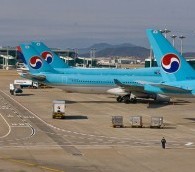Destination: South Korea
How Korean Karaoke Changed My Life
by Lavinia Spalding | 08.09.16 | 1:05 PM ET
After being turned away from the school choir, Lavinia Spalding lost her love of public singing. Then she moved to South Korea.
World Travel Watch: G20 Alert in Seoul, Volcano in Indonesia and More
by Larry Habegger | 11.03.10 | 3:14 PM ET
Larry Habegger rounds up global travel news
Photo You Must See: Flocking to Geumgang Lake, South Korea
by World Hum | 02.09.10 | 10:32 AM ET
A flock of teals fly over Geumgang Lake in Gunsan, about 168 miles south of Seoul.
Welcome to Seoul’s ‘Air City’
by Eva Holland | 08.18.09 | 4:14 PM ET
Plans are in the works to build an “air city” on the grounds at Seoul’s Incheon International Airport, USA Today reports. The complex, aimed at grabbing a bigger share of in-transit passengers in the region, could apparently include apartments, studios and runways for in-house fashion designers, a theme park, a marina and a clinic designed for medical tourists. Anyone else smell a sequel to The Terminal?
It’s a Reality TV World, After All
by Julia Ross | 05.26.09 | 12:49 PM ET
Is reality television a viable conduit for cross-cultural understanding? It’s an interesting question now that the world has gone reality TV-mad. Global versions of “Big Brother” have sparked discussions on everything from racism to AIDS, and wacky game shows continue to fascinate foreigners trying to understand Japan.
China’s Sex Theme Park That Wasn’t
by Julia Ross | 05.18.09 | 12:50 PM ET
Maybe it was the red thong. Officials in Chongqing, China, ordered the country’s first-ever sex theme park—set to open this fall—demolished over the weekend after news of its opening drew global media coverage and embarrassment among locals.
The park—dubbed “Love Land”—promised the chance to see giant replicas of genitals and exhibits on sexual history, with the goal of improving sex education in a country where open discussion of the topic has traditionally been taboo.
Can Korean Food Break the ‘Top Five’?
by Julia Ross | 05.18.09 | 10:51 AM ET
When it comes to kimchi, the government of South Korea means business. The Ministry of Food, Agriculture, Forestry and Fisheries recently announced a $40 million fund to enact its “Global Hansik” campaign to make Korean food one of the five most popular ethnic cuisines in the world.
The Ministry’s rather methodical strategy includes introducing Korean cooking classes at Cordon Bleu-affiliated culinary schools worldwide; promoting celebrity Korean chefs; and increasing the number of Korean restaurants overseas to 40,000 by 2017.
Chogye Temple, Seoul, South Korea
by World Hum | 04.14.09 | 11:57 AM ET
A Buddhist woman reads a sacred book in front of a sermon hall as lotus lanterns with name cards hang on the wall at the Chogye temple in Seoul, ahead of May 2 celebrations in the country to commemorate Buddha's birthday.
Seoul, South Korea
by World Hum | 03.31.09 | 11:08 AM ET
A man stands in front of a statue titled "Seoul broods a golden egg" at the Seoul city hall plaza in central Seoul.
Morning Links: A Surge in Train Travel (Stories), the Truck Stop Dentist and More
by Michael Yessis | 03.09.09 | 7:38 AM ET
- Several airlines are rerouting flights after North Korea said it can’t guarantee the safety of flights near its airspace during joint U.S.-South Korean military exercises scheduled to begin today.
- The Washington Post gave President Obama’s vision for high-speed rail the front-page treatment.
- Andy Isaacson took a slow train across the U.S.—and recorded voices from the rails—for the New York Times.
- Here’s a touching piece by Jeff Greenwald about Nepal and the death of his father.
- Catherine Watson gets lost in Bahrain.
- Meet the truck stop dentist, Dr. Thomas P. Roemer of Exit 284 of Interstate 80.
- The Delta Queen is now a floating hotel in Chattanooga, Tennessee.
- Air Asia is apparently giving bloggers the opportunity to be pilots—and some hilarious fodder in this promo video. (via @Marilyn_Res)
- Finally, congrats to the winners of this year’s North American Travel Journalism Association awards, including World Hum contributor Julia Ross.
Got a suggestion? .(JavaScript must be enabled to view this email address) your link.
One Traveling Man’s Weak-Dollar Dating Survival Kit
by Rolf Potts | 02.13.09 | 10:09 AM ET
With superior dentistry and monolingual charm, you too can pick up women overseas. Rolf Potts gets all Maxim magazine.
Morning Links: Vegas to L.A. High-Speed Rail, ‘the Gifts of Travel’ and More
by Michael Yessis | 02.13.09 | 9:44 AM ET
- Continental flight 3407 crashed outside of Buffalo, New York. Fifty people died.
- Looks like the stimulus bill might contain some extra funding for a high-speed rail link between Los Angeles and Las Vegas.
- How will the United States look after its economic tumble? It’s the cover story in the latest issue of The Atlantic.
- In Dubai, the economic climate has brought forth an exodus of expats.
- Don George writes that “the gifts of travel are precisely what we need in daunting times like these.”
- Tom O’Neill chronicles the journeys of three North Korean defectors through China, Laos and Thailand on the way to South Korea. (Via Passport)
- Brave New Traveler asks: When does budget travel become exploitation?
- Northwest Airlines says it will start serving peanuts again on its flights. Passengers worried about peanut allergies say they will start planning trips on airlines other than Northwest.
- Germany, the U.S. and China are among the countries fighting the international battle of Ferris wheels. The Great Orlando Wheel may have the best promo video ever.
Got a suggestion? .(JavaScript must be enabled to view this email address) your link.
Malcolm Gladwell on Aviation Safety and Security
by Rob Verger | 01.30.09 | 2:00 PM ET
Perhaps the most fascinating section of Malcolm Gladwell’s new book, Outliers: The Story of Success, is the chapter called “The Ethnic Theory of Plane Crashes.” Gladwell explores two plane crashes—one Colombian (Avianca Flight 52) and another, South Korean (Korean Air Flight 801)—and how the culture of the pilots perhaps contributed to each disaster. He focuses on how well the pilots communicated with each other and with air traffic control. Poor communication in these examples, he argues, has to do with something called a culture’s Power Distance Index (P.D.I.)—the term and concept come from psychologist Geert Hofstede—which is a measurement of “how much a particular culture values and respects authority,” as Gladwell defines it. Countries with a high P.D.I. generally value being more deferential towards authority, and thus not contradicting a superior (the U.S. and New Zealand both have a low P.D.I.). Gladwell argues that since both Colombia and South Korea rank towards the top of the P.D.I. list, the subordinate members of their cockpit crews were unable or unwilling to speak up as assertively as they should have about safety concerns.
I interviewed Gladwell in early November for an article for The Boston Globe and asked him if he would suggest changing anything in general regarding airline security. “Not really,” he answered, but added that he was more concerned “about the mistakes that pilots make and air traffic controllers make in the course of doing their jobs than I am about the threat posed by terrorists. It’s the classic thing where we demonize and terrify ourselves about the threat from outside and forget about the threat that we pose to ourselves.”
But it’s the connections that Gladwell draws in “Outliers” between culture and plane crashes that have become, not surprisingly, controversial.
Morning Links: Goa Beach Parties, Kim Jong Il’s Childhood Home and More
by Michael Yessis | 12.23.08 | 9:37 AM ET
- Arab women are finding new freedoms as flight attendants.
- In the U.S., a former T.W.A. flight attendant looks back on the days “when there were three dinner options on flights from Boston to Los Angeles—in coach.”
- Kim Jong Il’s childhood home in South Korea is open to travelers.
- The economic crisis hits the glass blowers of Murano.
- There will be no Goa beach parties in the coming weeks. Indian authorities are worried about security after the Mumbai terrorist attacks.
- Recce posted its Best Stories of 2008.
- Christopher Elliott offers some travel strategies for 2009.
- William Langewiesche reconstructs the collision of two planes over Brazil in 2006. Joe Sharkey has a few harsh words for the story.
- Airport security in Birmingham, England strip searched a clown. PC Konk the Clown said, “I’ve never had this problem before when I’ve been to international clown conventions abroad.” My favorite part is the groan-inducing headline: “Clown Finds Airport Security no Laughing Matter.”
Gary Shteyngart in Seoul: ‘A Megacity With Endless Incongruities’
by Michael Yessis | 11.21.08 | 10:42 AM ET
Here’s another compelling piece from the author of “The Russian Debutante’s Handbook” and “Absurdistan” in the latest issue of Travel + Leisure. He writes: “Korea is a country with one of the unhappier histories the world has known, a present that amounts to the frenzied tapping of the fast-forward button and a future that may already be here.”
- « Prev Page
- Next Page »









